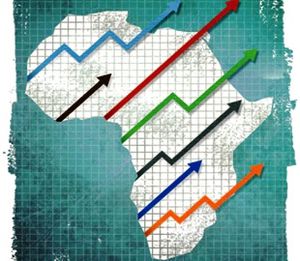 Sub-Saharan
Africa's economic growth should increase to 5.3 percent next year, with strong private and public investment underpinning the region's robust performance, the World Bank said on
Monday.
Sub-Saharan
Africa's economic growth should increase to 5.3 percent next year, with strong private and public investment underpinning the region's robust performance, the World Bank said on
Monday.
The bank lifted its forecast for 2014 from the 5.1 percent projected earlier this year. The region was expected to grow 5.5 percent in 2015, up from a previous forecast of 5.2 percent, it said in its bi-annual 'Africa's Pulse' report.
Growth for this year is forecast at 4.9 percent, higher than last year's 4.2 percent. The figure is more than double the bank's 2.3 percent estimate for global growth in 2013, underscoring the attractiveness of the continent for investors.
But African countries could be vulnerable to declining commodity prices and the eventual tapering of the U.S. Federal Reserve's bond-buying stimulus, the organization said.
It cited a 2010 World Bank study suggesting that a 100-basis point increase in high-income country base interest rates is correlated with a 110- to 157-basis point rise in developing country yields.
"The implications of the increase in base rates are an increase in the cost of raising capital for developing countries, including those in Sub-Saharan Africa, with deleterious consequences on investment and growth," the report said.
Although strong export growth has also contributed to the region's economic advance, many countries are prone to major swings in their fortunes because they rely on a single commodity for more than 50 percent of export earnings.
"High dependence on one or a few commodities makes Africa's resource-rich countries vulnerable to sharp movements in prices of these commodities," said World Bank Africa economist Punam Chuhan-Pole, the report's author.
Foreign direct investment flows to Sub-Saharan Africa are expected to rise 24 percent to around $40 billion in 2013. Governments in the region, such as Ethiopia, Ghana, Nigeria and South Africa, have also increased spending on public investment, much of it geared towards transport and power infrastructure.
The report added that while sustained growth is necessary, it is not enough to reduce poverty significantly and nearly half of all Africans live in extreme poverty today.
Although this could fall to between 16 percent and 30 percent by 2030, the continent would still be home to the majority of the world's poor.
To accelerate poverty reduction, Africa will need to sustain healthy GDP per capita growth, "both by stimulating expansion of the economy and by dampening the rate of expansion of its population," which is growing by 2.7 percent a year.
However, data on poverty in many countries are unreliable, underscoring the need to strengthen Africa's statistical systems, the multilateral lender noted.
Source: http://www.reuters.com/article/2013/10/07/us-africa-growth-idUSBRE9960MY20131007

/image%2F0994931%2F20220514%2Fob_0ba45b_picture-interview2.jpg)